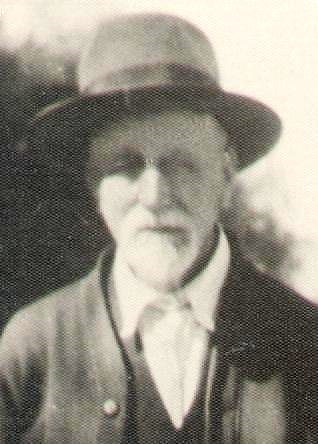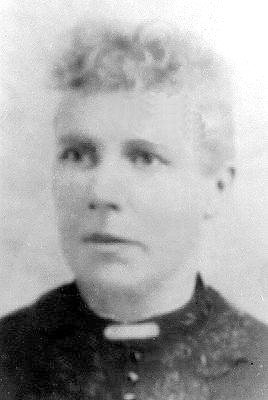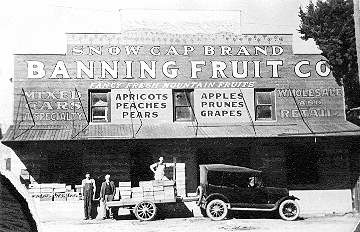Fourth Generation--
The following section
was taken (those portions in quotation marks) from the books, History
of Banning and San Gorgonio Pass, written by Tom Hughes and
published in 1939 by the Banning Record, and Centennial of
the First Baptist Church of Banning California, written by
our own Dorothy Jost.

"Christopher Francis Jost was born at Guysboro, Nova Scotia, June
12, 1846. His father was Christopher Jost, his mother's maiden
name was Harriett Hart. He attended Acadia College at Wolfville
two years, then went into a mercantile business with his father.
"At the age of 30 he
left his native town, coming almost directly to Banning to
open a store and act as paymaster for the Rev. Winfield Scott.
Young Jost came over the Central Pacific to San Francisco,
thence by boat to San Pedro. As he was shipping a $2600 stock
of general merchandise, he rode a freight train from the port,
reaching San Gorgonio on the sixth of March, 1877. There being
neither station nor siding at the Banning site he hauled his
merchandise by team from San Gorgonio up the Water canyon.
"Of the few store buildings
of that time, none is standing today. He estimated the population
of the entire Pass was less than 200. There were no commercial
orchards, and the only ranches he recalled were the Gilman,
the Edgar, the de Crevecoeur at Potrero, and the Rans Moore
cattle ranch at the mouth of Water canyon.
"Jost went directly
to the lumber mill at the head of the canyon, above the Camp
Comfort site, where some 40 men were at work getting out sugar
pine and building the mill and the 10-mile flume above the
canyon.
"At the completion
of the flume, in June, the store was moved to the railroad.
Young Jost and Dr. Murray slept in the store. Mr. Jost related
that some of the goods were shipped from such distant points
as Chicago and Boston.
 "When
Scott sold the store to Worsham, Christopher left it, and on
January 11, 1878, at San Bernardino, he was married to Mrs. Marguerite de Crevecoeur, who lived on her quarter section ranch
in Potrero, above the present reservation settlement. Ben de
Crevecoeur was a baby then, Jeff was three, and Wally five.
The two older boys went to the first little school in Banning,
but for a time a sister of Dr. King was employed as teacher
at the ranch.
"When
Scott sold the store to Worsham, Christopher left it, and on
January 11, 1878, at San Bernardino, he was married to Mrs. Marguerite de Crevecoeur, who lived on her quarter section ranch
in Potrero, above the present reservation settlement. Ben de
Crevecoeur was a baby then, Jeff was three, and Wally five.
The two older boys went to the first little school in Banning,
but for a time a sister of Dr. King was employed as teacher
at the ranch.
"Jost went into the bee business with Walter Hathaway, his neighbor
in Hathaway canyon, buying Hathaway out after the first year. In the creation
of the Morongo Reservation Mr. Jost, along with Hathaway, Barker, Sam Black,
and others, was dispossessed in 1888. He was given a half section of dry
land northwest of town. On account of the children's schooling he did not
move to the new ranch, but bought the home at Murray and Hayes. The house
was built by Joseph Fountain in 1887.
"Mr. Jost described
his relations with the Indians during his ten years in the
Potrero as having been entirely pleasant. He said the few arguments
he did have were with the Indian department officials. He hired
many an Indian to work on his ranch, paying them $1 a day and
board. He spoke in high terms of Captain John Morongo as a
most intelligent and capable leader.
"Mrs. Jost died in
1917, leaving eight sons: Waldemar and Ben de Crevecoeur, Chris
Christensen, Henry Stubbe, and four sons of Mr. Jost--Francis
[Frank] Christopher, Burton Cranswick, George Marshal, and
John Jefferson. The Misses Laura and Clara Stewart, living
on their ranch west of town, are granddaughters of Mrs. Jost.
"Mr. Jost had been
deacon in the Banning Baptist church since its organization.
He never sought or held public office other than to serve in
1890 as road overseer, and in 1900 as census taker in the Coachella
desert. At the time of his death, October 31, 1936, he was
Banning's second oldest arrival in point of residence."

Chris shared his parents'
devotion to the Lord and commitment to the church:
"It must be recorded
that one of these [earliest] saloons housed Banning's first
indoor public religious ceremony. Mr. Jost recalled how storekeeper
Worsham conducted Sunday services there on more than occasion.
But it was certainly the Reverend Winfield Scott who preached
the first Protestant sermon in the Pass. In the summer of flume
building Scott delivered his sermon under a sycamore at Rans
Moore's, and young Jost [31 years old at the time] conveyed
those who wanted to hear the preaching."
"The Baptist church,
the first American church in the Pass, was organized February
18, 1883. Christopher was the first to be admitted to membership,
on August 19th. H. Kinney, in The Church That Never Gave
Up, said ‘Thus was recorded the entry into the church
of a man who later was prosperous enough to pay the pastor
in a lean year, yet was humble enough to volunteer as janitor,
again in a lean year. At various times he served as deacon,
trustee, moderator, and clerk, and was faithful until his death
at the age of ninety years.’
"Marguerite was baptized
in Moore creek in the Water canyon on October 26, 1884, the
first adult to be baptized into the church. The four Jost brothers--Burt,
Marsh, Frank and John (only 9 years old)--were baptized together
on February 6, 1895.
"Marguerite was a leading
figure in the organization of the local Women's Christian Temperance
Union."

"One of the earliest
permanent settlers to come to the Pass by rail was Christopher
[F.] Jost, who rode a freight train from San Pedro with a carload
of merchandise, reaching Summit station (Beaumont) March 6,
1877. He came to work for the fluming company as storekeeper
and paymaster. There being neither station nor siding at the
proposed flume terminus, Jost unloaded his cargo at Summit
and hauled it up the Water canyon.
"The sawmill and flume
were well under way when young Jost arrived, and he at once
commenced storekeeping at the camp. This was the beginning
of that historic enterprise, the Banning general store. Here
also, runs the legend, the first saloon in the Banning region
swung open its doors; but its life must have been more than
brief, for no sooner had it opened than the camp was abandoned.
When the optimistic liquor man proposed to open his saloon
at the camp, Christopher advised against it. He thought there
were not enough customers to make it profitable to buy liquor
and haul it up the canyon. "Oh, that’ll be all right," replied
the optimist; "I can make a barrel of it for two dollars."
"Upon completion of
the flume the store stock was moved down to the railroad, becoming
the premier merchandising business on the Banning site. When
Scott sold the store to Worsham, Christopher left it, and on
January 11, 1878, at San Bernardino, he was married to Mrs.
Marguerite de Crevecoeur, who lived on her quarter section
ranch in the Potrero, above the present reservation settlement."


Sources:
The History of Banning and San Gorgonio Pass, by Tom
Hughes
Centennial of the First Baptist Church of Banning, Calif., by
Dorothy Jost
Family information

Links:
Allan Jost's gedcom of our Jost family:
http://www.jostfamily.tk/
Halifax County, Nova Scotia GenWeb
Project:
http://www.rootsweb.com/~nshalifa/
Guysborough County, Nova Scotia GenWeb
Project:
http://freepages.genealogy.rootsweb.com/~guys/index.html

March 9, 2013
Polli Turner